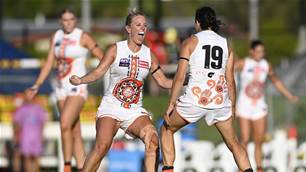Is there a more recognisable face in Australian sport than Ron Barassi’s?
Is there a more recognisable face in Australian sport than Ron Barassi’s? Was there ever a more fitting high priest for the hot gospel of Australian rules? When he was needed, along he came, curled lip, pumping fists, front and centre, leading the charge into the consciousness of non-believers. In fact, the famous 1970 grand final, that Barassi masterpiece, was the first live VFL telecast in New South Wales.
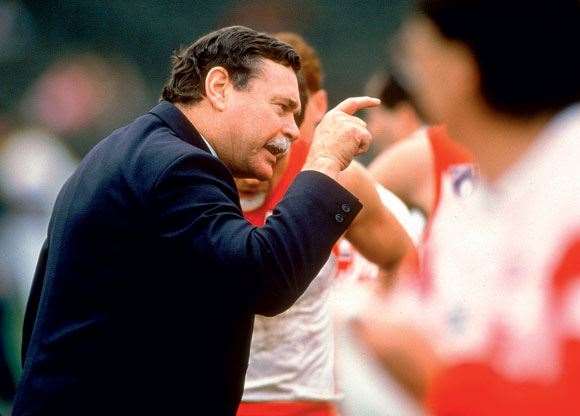 Coach Barassi lays down the law to his Swans in 1993. Images: Getty Images
Coach Barassi lays down the law to his Swans in 1993. Images: Getty ImagesHas anyone ever been more synonymous with “winner”? The grand final experience is something he’s owned, as a coach and a player. He’s won ten of them in both guises, and participated in 17.What about force of will? He radically transformed three clubs, first as a player, then as a coach, and his fourth and fifth tries led to delayed-reaction success for Melbourne and Sydney. His image has dominated our media for six decades as he’s moved through his various phases: matinee idol footballer, curmudgeonly coach and elder statesman. A little wiser and gentler now, he transcends sport and embodies everything we aspire to be. Ron was never a respecter of natural ability ‒ after all, that’s just what you were given. Nothing to brag about. It’s how hard you work to get the rest of the way that matters, and that philosophy has marked his own career as a coach and player, and his relationships with others.
Barassi had a way of playing, coaching and doing just about anything else that made it seem like the world’s future depended on the outcome ‒ but he’s just as famous for his ability to get over it once the outcome is decided. Those of us who saw the CCTV vision of Ron getting a kicking outside a cafe because he had the guts, at 72, to stand up for a woman who’d been punched, still burn with wrath at the thought of it. Ron laughs it off, dismissing the perpetrators as mere cowards.
His new biography, Barassi, tells the story of a dauntingly driven man. But behind that image, so large, so energetic, so emblematic, one still suspects there’s a boy who lost a father he barely knew, and hasn’t got round to coming to terms with the fact that he misses him. He will, though. There’s always something new with Ron Barassi. He talks to Robert Drane.
A lot of people believe your life has been defined by your successes. What’s the most important attribute Ronald Dale Barassi has had that has led to that success?
Conviction? And to use an Aussie word, being fair dinkum about what I’m on about. You’re born with them. I was helped by a mother who was built along the same lines. My family were all solid citizens, so to speak. So I didn’t have any bad influences. By the time I was 16 or 17, by which time you’re moulded to a degree, according to the experts, Norm Smith was a fantastic guy to put in charge of me, when Mum went to live in Tasmania. He was the man she relied upon. My father was a good team-mate of Norm’s. There were very good links to the Melbourne football club. Very, very good people.
I’ve had reasonably good judgement. On the field, but also when you’re a coach and you have time to think it through. I made a few mistakes, but I’ve not known anyone who doesn’t. I’d like to meet the person. I think my enthusiasm, too. I have a saying I pinched from somebody: “Work is what you do when you don’t like what you’re doing.” I hardly ever worked. I made sure I liked what I was doing. If you love it, it’s far easier.
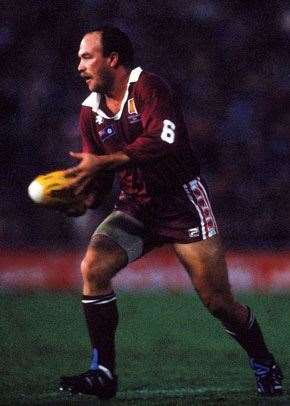 Ron Barassi in all his glory for the Demons in 1964.
Ron Barassi in all his glory for the Demons in 1964.Images: Getty Images
As a kid, I could see that you were very energetic and dynamic. You even seemed like an angry person on the field. I could see you were a bloke who made up his own mind about what happened to a game, regardless of what the other 35 blokes on the field thought. What drove you?
I’ve got the sort of face that, if I’m looking deadly serious, it looks to have a touch of anger in it. It makes it easy to say, “Oh, he’s angry”, but I hadn’t been. Mind you, I certainly did get angry a few times. Maybe a few hundred times. Some people might say a few thousand ...
I remember at Preston Tech, in a cross-country run. I won it the year before, and being a year older, you start further back. I passed this young guy who had a professional trainer with him. Unheard of then. The kid said to his coach, “Barassi’s going like a rocket. What do I do?” And the trainer said, “Don’t worry about it. He won’t last the distance.” Well, I can remember even now, I thought, “Mmm. You won’t get past me, mate.” I had had that natural challenging outlook on life that made it more enjoyable for me. Again, I don’t know where that came from.
There’s a saying that’s ten words, and each word is only two letters, but it’s powerful: “If it is to be, it is up to me.” No matter what you read, or what you’ve been told, what instructions you’ve read, it doesn’t matter. In the end, you have to go and act on it. You have to go and do it. That makes everyone the most important person in their world. Not the world, their world. I don’t think enough people get hold of that truth.
You’ve seen dynasties come and go. You must have learnt a lot from that.
Footy is one of the biggest team games in the world, in size. You’ve got 18 blokes on the field. Unless the administration’s on the ball, you’ll never have a long run of success. People will say, “Come on, Ron, what about the players on grand final day?” Well, of course it’s up to them, but who makes them perform? It’s the coaches. Who chooses thecoaches? Who chooses the medicos? Who gets the money rolling in so you can afford the extra little things for players? Who runs the group? That’s where success comes from. Wherever there’s a group of people trying to do things, they have to unite, get the best out of each other. All that stuff. Because of the rules today, it’s hard to stay on top, stay strong.
As a football lover, I’d rather it was that way than have a Melbourne dominate like they used to. That sort of thing’s probably impossible now. A club might come along one day with players of gigantic ability who are happy as hell – once or twice every 100 years. Even Geelong gradually got together an off-the-field team, a secretary, coach ... But the last man in the link these days is the football manager, and they got that bloke from Richmond, Neil Balme. Apparently he’s made a big difference. Now the coach is gone, the president’s gone. But the other thing is that a grand final is bloody hard to win. Things can go wrong on the day.
As a coach you were meticulous about the details. You were hard on skill deficits. Now the game is what you wanted it to become. You don’t have those random elements any more. You’re not going to get a Crosswell, Kekovich or Blight kicking the wrong way occasionally, but being brilliant the rest of the time. It’s affected the game as a spectacle.
Yes, well, you have waves of players all doing the right thing now because of drilling, not judgment. There’s not enough high-marking, not much long kicking, not much one-one-one. There’s hardly any duelling, and that’s so interesting: “Who’s gonna win?” It makes a game more interesting.
I’ve always been concerned about the future of our game. When I was 25 or 26 I was talking to a mate, Ian Johnson, who was secretary of the MCC, and said I was thinking of going full-time into football, because I was worried about the opposition from soccer and that sort of stuff, and he said, “Now Ronnie, what you’re talking about may be right, but don’t ruin your life.”
A few years later, Sheeds convinced his club, Richmond, who were sailing along very nicely, to let him go out and promote football at schools and junior levels – you had your own zones in those days – so it was going to reverberate successfully for Richmond. Naturally I thought, “Geez, I would have jumped on that.” He’s a man of vision.
We’re the only country in the world with six types of football, four going well: the two rugbys, Aussie rules and soccer. Most countries only have one doing well. America has all types of football, but none doing well, except gridiron. It’s a worry. I think in 50 or 100 years, we’ll have two or three doing well. I don’t want us to be the one that drops out. Look, it might be that rugby league and union join back together into a new game. But it mightn’t happen because of that social divide between the two.
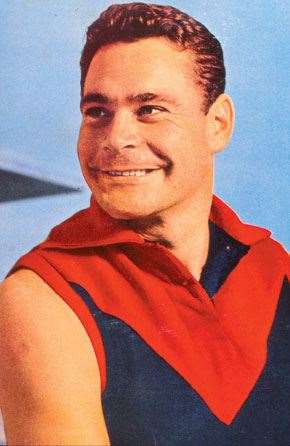 One of Australia’s famous faces. Images: Getty Images
One of Australia’s famous faces. Images: Getty ImagesYou’ve always had enormous self-belief. Do you believe in something outside yourself? Do you believe in God, for example?
No. I can’t convince myself there is a God. I’m very suspicious of religion. I think about it quite a bit. Where did God come from? The Big Bang theory, I don’t go along with that at all. You can’t have an explosion out of nothing. Where did the first tiny atom of matter come from? Huge questions, those things. I’m not a believer in God, and I certainly don’t believe you go to heaven or hell. But we might get to meet the Great Man, or Great Woman ... we don’t know.
You always seemed to have a bit of a scientific and mathematical mind ...
The best influences I could have had were Norm and Len Smith. I’ll give you one example of Len’s mind. He said, “Ron!” as I was going past his office one day. He was in charge of the engineering department of this big firm. I said “What’s up, Len?” He said, “What’s the quickest goal you think we could kick?” I said “Nine, ten seconds, I suppose.” He said, “Let’s go through it. The time starts when the umpire’s bounce hits the deck. It goes up, comes down. What if a guy was hitting it with his hand, and taps it, right along the centre
line so we’re not losing distance, and the receiver takes it cleanly at full pace, and as soon as he knows he’s got it cleanly, which is probably a millisecond before he grabs it, he puts all his concentration into kicking the ball long, forward and to the square? The bloke doesn’t take a mark, but taps it to a bloke going past who kicks a goal.”
I’m following this. He said, “I reckon that would take even as low as six seconds.” I said “Yeah, so what?” He said, “That means we could score ten goals a minute!” He laughed, of course. He wanted the game to speed up. He was the first man to say, “I don’t want any U-turns. I don’t want blokes going toward defence, having to turn around and kick it back up to the forward line. So I’ve got to have blokes going past for handballs.” So that was a basic rule. No U-turns. It made runners on either side go past, calling for the ball. We used to have quite a few discussions. Norm was pretty intelligent, too. They were enquiring, not just the scientific side, but the human side as well.
So is it fair to say that emotionally and spiritually, Norm Smith was an influence, but in terms of football thinking, Len was a greater influence?
Len never coached a great side himself, but I reckon he’d have been a better coach of a poorer side, and Norm would have been a better coach of a better side. The factor that comes in there is that you have to keep their heads under control. But for me to be in the middle of all that, that was just a fluke.
Have the attributes a player needs to succeed changed as the game has changed?
Reading a game isn’t as big a factor. But you’ve got to be more of an athlete. You’ve got to like training, because you’re full-time. Occasionally I came across guys who didn’t like training in those days, but that was nothing compared to today. If you’ve read that book of mine, you’d know who they were. Brent Crosswell! Jesus! Unbelievable! He could have been anything. He was just lazy. But he could play. But a lot of changes have been for the better, too. The kicking for goal today, snap shots, the banana kicks, the ground kicking. Amazing.
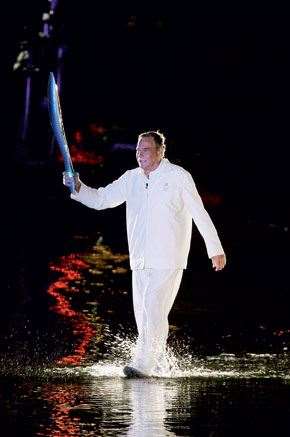 Ron Barassi Olympics
Ron Barassi OlympicsImages: Getty Images
Your public life defines you for everyone out there, but what defines you more to you? Your public or your private life?
I’ve had a much better football career than I’ve had a personal life. I’ve had a divorce and those sorts of things. Not very nice to go through.
What was harder: player, player-coach or coach?
Probably player-coach is the hardest. It’s not done now, and it probably shouldn’t have been done when I was playing. Very demanding. I did ask some coaches, about eight or nine years ago, what did they enjoy most, playing or coaching. To my surprise, all except one, who was 50-50 anyway, said coaching, including myself. I think it’s because a coach puts in more than a player. Not physically, but it’s almost 24/7. There’s an old saying, the more you put into something, the more you get out of it. It’s a hell of a thrill to coach a premiership side.
Who’s the best player you’ve seen in the last 30 years?
Leigh Matthews. The Yanks have a great phrase, “Most Valuable Player.” Leigh Matthews was that.
Best ever?
Still Matthews. He won Best and Fairest six or seven times at a top club, full of all-time greats.
Often your approach would change a player, and he’d become your work of art. Which work of art would you be most proud of?
Well, one thing that pleases a coach is to have a little scheme or tactic that works. In the 1975 grand final, we decided to drop Doug Wade. He was told on Thursday night, and half an hour later there’s a knock on the door. It’s Doug. He wanted to present his case. He was so respected that there were no problems. I said yes. I had to figure out how to best use him at that stage of his career. He played a forward pocket-type role instead of full-forward – and he’d been a great full-forward. It was completely out of character. I virtually wouldn’t let him go for a mark unless he had to. I said, “Just go for it on the ground.” He kicked four goals and could have had six. It was his first premiership. He’s turning 70, and he’s invited us on a three-week tour around Europe in October.
You’ve always loved success, but you’ve always had the ability to block out setbacks. How have you done that?
I can’t answer those questions. It’s just me. It’s always a conscious effort, but it occurs naturally. There have been a couple of occasions where I’ve had to fight wrong emotions. But in the main, my natural inclination is to get off the deck and start fighting.
Related Articles
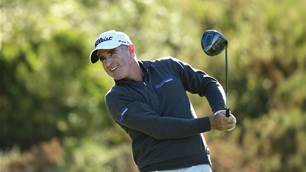
Video interview: Drinks With ... Matt Millar
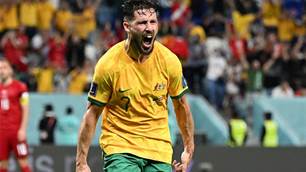
Socceroo star's message to kids: Don't be an AFL player
